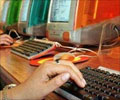A new gadget that can measure the stress and mood levels of computer users was unveiled Thursday at Asia's biggest IT trade fair.
The BioDynamic Signature (BDS) technology, unveiled by Israeli high-tech company IDesia, uses a person's unique heartbeat to tell whether they need to take some time out to relax.The user grasps two sensors shaped like computer mouses to measure the electric activity of the heart in minute detail.
Software then combines the measurements with prerecorded personal details such as age and sex to calculate various indicators for stress and mood.
"It's like fingerprints. Everyone's is different," said David Chang, a vice president with the company, at Computex Taipei.
And the BDS, which IDesia aims to put on sale in the fourth quarter, got the thumbs-up from members of the public who tested it at the fair.
"Understanding your mood at the start of the day is especially critical," a 60-year-old man told AFP after trying out the technology.
Advertisement
IDesia said the technologies have drawn interest of leading Taiwanese computer makers such as Compal Electronics and Wistron.
Advertisement
The sensors can also be linked to other devices such as mobile phones and gamepads, the company said.
More than 1,700 exhibitors are taking part in the five-day Computex Taipei, featuring 4,861 booths and expected to greet around 120,000 visitors, including 35,000 international buyers, organisers say.
They expect the fair to generate around 20 billion US dollars in business.
Source-AFP














